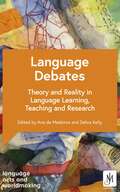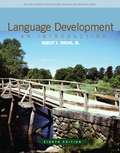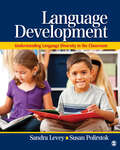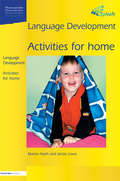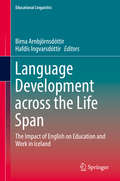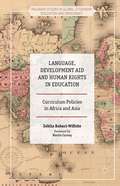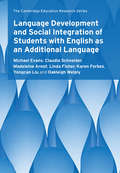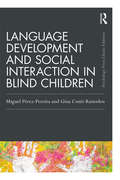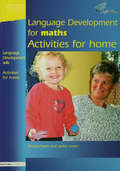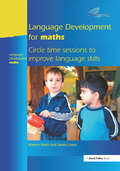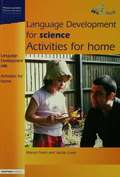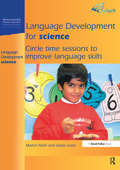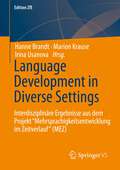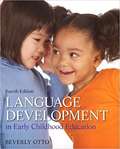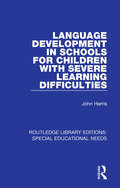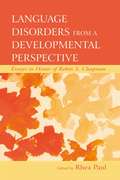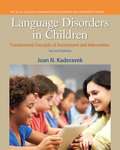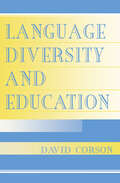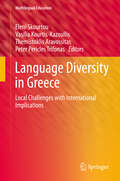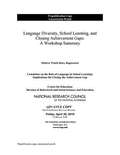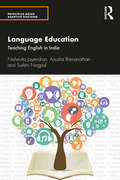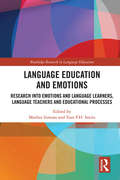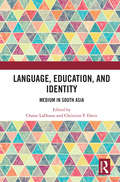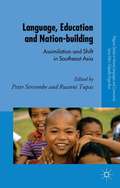- Table View
- List View
Language Debates: Theory and Reality in Language Learning, Teaching and Research (Language Acts and Worldmaking #1)
by VariousThis book captures an urgent moment for language teaching, learning and research. At its core are a series of debates concerning gender stereotyping, the place of linguistics in modern languages, language activism, multilingualism and modern languages and digital humanities. Taken together, these debates explore the work that languages, and that those who learn and speak them, do in the world as well as the way we think 'through' and 'in' a language and are shaped by it. Language Debates acknowledges the history of language teaching and the current realities of language teaching and learning. It is bold in suggesting ways forward for reform and for policy, setting languages and language learning at the heart of a consciously transformative set of goals. This book is therefore essential reading for academics, language teachers, policy makers, students, activists and those passionate about progressing language learning and teaching. The editors and contributors make up a multilingual and multicultural team who work across languages, cultures and borders with a globally-informed approach to their work. Uniquely, the debates in this volume are based on events with participants in the Language Acts and Worldmaking Debates Series and/or workshops within the wider research project and take into account the ensuing discussions there. Each debate is accompanied by an interview which serves as a model on how to continue the conversation beyond the printed pages of the book. You can also discover ways to join the debate through links on the Language Acts and Worldmaking series website (www.jmlanguages.com/languageacts) which includes recorded debates, additional materials and more information about the series. Like all the volumes in the Language Acts and Worldmaking series, the overall aim is two-fold: to challenge widely-held views about language learning as a neutral instrument of globalisation and to innovate and transform language research, teaching and learning, together with Modern Languages as an academic discipline, by foregrounding its unique form of cognition and critical engagement. Specific aims are to:· propose new ways of bridging the gaps between those who teach and research languages and those who learn and use them in everyday contexts from the professional to the personal· put research into the hands of wider audiences · share a philosophy, policy and practice of language teaching and learning which turns research into action· provide the research, experience and data to enable informed debates on current issues and attitudes in language learning, teaching and research· share knowledge across and within all levels and experiences of language learning and teaching· showcase exciting new work that derives from different types of community activity and is of practical relevance to its audiences · disseminate new research in languages that engages with diverse communities of language practitioners.
Language Development: An Introduction (Eighth Edition)
by Robert E. OwensThis leading and comprehensive text on language development is rich in information, research, examples, and activities. A thorough and readable introductory text on language development, this book covers all aspects of the complex subject -- including syntax, morphology, semantics, phonology, and pragmatics -- while explaining each idea and concept in a way that is easily understandable by even beginning students of the field. Rich in pedagogical aids like discussion questions, chapter objectives, reflections, and main point boxed features, the eighth edition of Language Development also emphasizes culturally and linguistically diverse children and bilingual and dialectical developmental information -- a discussion that accurately reflects the diversity of life and language in the United States.
Language Development: Understanding Language Diversity in the Classroom
by Sandra Levey, Susan PolirstokPrepares future and current teachers to understand language development, differences, and disorders—and the factors that lead to classroom success Language Development: Understanding Language Diversity in the Classroom offers comprehensive coverage of the language development process for pre- and in-service teachers while emphasizing the factors that further academic success in the classroom, including literacy skills, phonological awareness, and narrative. With chapters written by respected specialists in various fields, this interdisciplinary text illuminates the impact of language development on learning success and distinguishes between language differences and disorders, integrating illustrative case studies as well as helpful classroom strategies that teachers can implement right away.
Language Development 1a: Activities for Home
by Marion Nash Jackie LoweFirst Published in 2005. Routledge is an imprint of Taylor & Francis, an informa company.
Language Development across the Life Span
by Birna Arnbjörnsdóttir Hafdís IngvarsdóttirThis book offers insights from a seven-year study into the impact of English as an International Language at a national level, from the effect of rich English input on a previously monolingual people’s linguistic repertoire to its effect on the situated language use demanded of speakers who find themselves in a new linguistic environment for which they have not been prepared. The changes described in the book have occurred in a speech community that identifies strongly with the local language, but finds itself increasingly having to use another language to perform daily functions in education and work. Findings describe how the official language and educational policies have not addressed this new linguistic ecology of Iceland. The findings of these studies have larger international practical, educational, empirical, and theoretical implications and should be relevant to anyone interested in in the impact of English as an International Language.
Language, Development Aid and Human Rights in Education: Curriculum Policies In Africa And Asia (Palgrave Studies In Global Citizenship Education And Democracy Ser.)
by Zehlia Babaci-WilhiteThe debate about languages of instruction in Africa and Asia involves an analysis of both the historical thrust of national government and also development aid policies. Using case studies from Tanzania, Nigeria, South Africa, Rwanda, India, Bangladesh and Malaysia, Zehlia Babaci-Wilhite argues that the colonial legacy is perpetuated when global languages are promoted in education. The use of local languages in instruction not only offers an effective means to contextualize the curriculum and improve student comprehension, but also to achieve quality education and rights in education.
Language Development and Social Integration of Students with English as an Additional Language (Cambridge Education Research)
by Michael Evans Claudia Schneider Madeleine Arnot Linda Fisher Karen Forbes Yongcan Liu Oakleigh WelplyGiven the current context of the experience of migration on schools in England and Europe, and the competing policies and approaches to social integration in schools, there is a need to understand the connection between language development and social integration as a basis for promoting appropriate policies and practices. This volume explores the complex relationship between language, education and the social integration of newcomer migrant children in England, through an in-depth analysis of case studies from schools in the East of England. The authors set this evidence against the background of policy debates in the wider international setting, including a critical discussion of assumptions underlying national narratives of mainstreaming and assimilation. In the light of an absence of national guidelines for appropriate practice in schools, the authors outline a model of inclusive pedagogy for English as an additional language (EAL) and a framework of home-school communication to promote effective EAL parental engagement in schools.
Language Development and Social Interaction in Blind Children (Psychology Press & Routledge Classic Editions)
by Gina Conti-Ramsden Miguel Perez-PereiraThe Classic Edition of this foundational text includes a new preface from Miguel Pérez-Pereira, examining how the field has developed since first publication. The volume provides an in-depth account of blind children's developing communicative abilities, with particular emphasis on social cognition and language acquisition from infancy to early school age. It provides insights into why the development of blind children may differ from that of sighted children and explores development of "theory of mind" and perspective taking in language learning. It also discusses the caregiver–child interaction, research on early intervention and practical strategies for blind children that can assist parents and practitioners. The up-to-date preface discusses recent neurological research and the comparison between the psychological development of visually impaired and autistic children. Language Development and Social Interaction in Blind Children continues to facilitate dialogue between those interested in the study of typically developing children and those interested in the development of children who are blind, and challenges some widely held beliefs about the development of communication in blind children.
Language Development for Maths: Activities for Home
by Marion Nash Jackie LoweBuilding upon the successful 'spirals' programme this series of books addresses language development in three core areas of the curriculum. Linking the work done in school with the simple games and activities to be used at home. All activities have been tried and tested - proven effectiveness. the video CD with teachers' book contains explanations and demonstrations of the programme and its implementation, with comments from the staff who have used it.
Language Development for Maths: Circle Time Sessions to Improve Communication Skills in Maths
by Marion Nash Jackie LoweBuilding on the successful 'spirals' programme this series of books addresses language development in the three core areas of the curriculum. Linking the work done in school with simple games and activities to be used at home. All activities have been tried and tested - proven effectiveness. A video CD contains explanation and demonstration of the programme and its implementation, with commetns from staff who have used it.
Language Development for Science: Activities for Home
by Marion Nash Jackie LoweThese simple play-based activities are ideal for teachers to copy and give out to parents who want to know how to help their child improve his or her science language skills and have fun at the same time. Activities are linked directly to the school-based Language Development Circle Time sessions, but can also be used independently. There is a clear structure and progression of ideas, with supporting black-line drawings to acts as prompts and simple record - keeping system to support home/school communication.
Language Development for Science: Circle Time Sessions to Improve Language Skills
by Marion Nash Jackie LoweThis book is the first of its kind to help practitioners specifically develop children's language skills in Science. The book incudes: guidelines to help teachers set up, run and assess circle-time sessions ideas for promoting children's thinking skills and emotional literacy video CD containing explanation and demonstration of the programme and its implementation, with comments from staff who have used it.
Language Development in Diverse Settings: Interdisziplinäre Ergebnisse aus dem Projekt "Mehrsprachigkeitsentwicklung im Zeitverlauf“ (MEZ) (Edition ZfE #11)
by Hanne Brandt Marion Krause Irina UsanovaDer Band präsentiert interdisziplinäre Befunde zur Relevanz von Mehrsprachigkeit für die Bildungsbiografien von Schülerinnen und Schülern in Deutschland. Im Fokus stehen sprachliche, persönliche und kontextuelle Faktoren, die die sprachliche Entwicklung von Lernenden beeinflussen können. Dabei kommen sowohl quantitative als auch qualitative Methoden zum Einsatz.
Language Development in Early Childhood Education
by Beverly W. OttoWritten by Beverly Otto, Language Development in Early Childhood Education, 4/e efficiently combines theory, research, and practice to provide a solid foundation for understanding language development in children birth through age eight. A comprehensive resource, it focuses on the development of phonological, semantic, syntactic, morphemic, and pragmatic language skills, children's understanding of written language, and ways in which this acquisition process can be enhanced in early childhood settings. Exact guidance on how to develop classrooms and other learning environments that enhance children's language development is also provided. Every chapter begins with interesting vignettes of young children's language development, and throughout all the chapters, readers will discover anecdotal narratives to illustrate key concepts and interaction strategies.
Language Development in Schools for Children with Severe Learning Difficulties (Routledge Library Editions: Special Educational Needs #31)
by John HarrisFirst published in 1988. Language is an important developmental ability which facilitates communication both at home and at school. It is also the foundation of many of a child’s learning experiences in school. A certain level of language is often a pre-requisite both for success in particular curriculum areas and for the ability to conceptualise generally. Language developing is thus a major concern for those who work with mentally handicapped children and it has come to be regarded as one of the main objectives within the special school curriculum. This book is concerned with the opportunities for language learning which special schools make available for severely mentally handicapped children. It describes how special schools seek to meet the very diverse needs of their pupils and provides a discussion of the success of contemporary approaches to encouraging language development. The author makes a number of constructive criticisms and suggestions for improving practice which should interest anyone whose work involves teaching children with severe learning difficulties.
Language Disorders From a Developmental Perspective: Essays in Honor of Robin S. Chapman (New Directions in Communication Disorders Research)
by Rhea PaulThe last 25 years have witnessed an explosion of research at the intersection of typical language development and child language disorders. A pioneer in bringing these fields of study together is Robin S. Chapman, Emerita, University of Wisconsin. This contributed volume honors her with chapters written by former students and colleagues, who track in their own research the theme of psycholinguistic contributions to our understanding of the nature and remediation of child language disorders. In this volume, such renowned researchers in child language development as Dorothy Bishop, Judith Johnston, and Ray Kent, among others, discuss their research in certain populations in the context of the significance of, limits of, and alternatives to Robin Chapman’s developmental interactionist perspective. Studies of disordered language in Down’s Syndrome and Specific Language Impairment, in particular, attribute much progress in our understanding of the pragmatic and comprehension skills in these populations to the developmental perspective. Language Disorders From a Developmental Perspective opens with a reprint of Robin Chapman’s seminal 2001 article from The Journal of Child Psychiatry and Psychology. It concludes with a new chapter from Dr. Chapman summarizing what we know and what we don’t know about language disorders within the developmental framework, and pointing to future areas of research and intervention. Clinicians as well as scholars will benefit from this book, as will students in programs of developmental psycholinguistics, child language disorders, and learning disabilities.
Language Disorders in Children: Fundamental Concepts of Assessment and Intervention
by Joan N. KaderavekThis text is more than an introductory look at language disorders. It goes beyond basic concepts and basic definitions to teach students how to analyze, synthesize, evaluate, and link the information they are learning. It offers readers opportunities for higher-order learning, while preparing students to become careful evaluators of information, as well as adept problem solvers. Organized by disorder groups and theme, Language Disorders in Children, 2/e helps students easily make connections between theoretical information and clinical practice through a number of thoughtful features such as case histories, clinical decision trees, and hot topic discussions. It's an approach that meets the needs of today's students to learn lifetime critical thinking skills, to see relationships between isolated ideas and facts, and to think like a speech-language pathologist.
Language Diversity and Education
by David CorsonThis introductory text for students of linguistics, language, and education provides background and up-to-date information and resources that beginning researchers need for studying language diversity and education. Three framing chapters offer an update on the philosophy of social research, revealing how important language is for all the processes of learning in which humans engage, whether it is learning about the world through education, or learning about the nature of social life through research in the human sciences. These chapters also review the links between language, power, and social justice, and look at dynamic changes occurring in "language diversity and education" research. Four central chapters give state-of-the-art, comprehensive coverage to the chief areas of language diversity that affect the practice of education: standard and non-standard varieties; different cultural discourse norms; bilingual and ESL education; and gendered discourse norms. This book is intended for graduate students of applied linguistics, sociolinguistics, psycholinguistics, the social psychology of language, anthropological linguistics, and other related disciplines; and graduate students of education, including in-service teachers taking advanced professional development courses. Special features enhance its usefulness as a text for courses in these areas: * A clear, jargon free writing style invites careful reading. * All ideas are well within the range that graduate students in the language disciplines or in education can relate to their work, but theoretical ideas are kept to a necessary minimum and linked with practical examples in every case. * Extensive references guide readers to the book's up-to-date, international, and cross-cultural bibliography. * "Discussion Starter" questions at the end of each chapter highlight key points and stimulate informed, reflective discussion.
Language Diversity in Greece: Local Challenges with International Implications (Multilingual Education #36)
by Peter Pericles Trifonas Themistoklis Aravossitas Vasilia Kourtis-Kazoullis Eleni SkourtouThis volume explores how linguistic and cultural diversity in Greece, caused by various waves of emigration and immigration, has transformed Greek society and its educational system. It examines the country’s current linguistic diversity, which is characterised by the languages of immigrants, repatriates, refugees, Roma, Muslim minorities, and Pomaks as well as linguistic varieties and dialects; and how schools and the state have designed and implemented programmes to deal with the significant educational challenges posed by these culturally and linguistically diverse groups. In this regard, the book takes into account the nature and evolution of Greek society; Greece’s traditional role as a labour-exporting country with a long history of migration to other countries; and major political, economic and social developments, such as the collapse of communism, the opening of borders in Eastern Europe, and the influx of immigrants from Muslim countries.
Language Diversity, School Learning, and Closing Achievement Gaps: A Workshop Summary
by National Research Council of the National AcademiesThe Workshop on the Role of Language in School Learning: Implications for Closing the Achievement Gap was held to explore three questions: What is known about the conditions that affect language development? What are the effects of early language development on school achievement? What instructional approaches help students meet school demands for language and reading comprehension? Of particular interest was the degree to which group differences in school achievement might be attributed to language differences, and whether language-related instruction might help to close gaps in achievement by helping students cope with language-intensive subject matter especially after the 3rd grade. The workshop provided a forum for researchers and practitioners to review and discuss relevant research findings from varied perspectives. The disciplines and professions represented included: language development, child development, cognitive psychology, linguistics, reading, educationally disadvantaged student populations, literacy in content areas (math, science, social studies), and teacher education. The aim of the meeting was not to reach consensus or provide recommendations, but rather to offer expert insight into the issues that surround the study of language, academic learning, and achievement gaps, and to gather varied viewpoints on what available research findings might imply for future research and practice. This book summarizes and synthesizes two days of workshop presentations and discussion.
Language Dominance in Bilinguals
by Carmen Silva-CorvalánWith contributions from leading scholars of bilingualism, Language Dominance in Bilinguals is the first publication to survey different approaches to language dominance, along with suggested avenues for further research. It illustrates how a critical approach to the notion of language dominance, as well as its operationalisation and measurement, can provide new insights into this burgeoning area of research. Drawing on adult and child data from a variety of language pairs, the chapters discuss how language dominance is to be conceptualised and distinguished from such related constructs as language proficiency and language competence. This volume is the first of its kind to present an overview of different approaches to language dominance from across the theoretical spectrum, as well as suggested avenues for further research. Accessibly written, Language Dominance in Bilinguals is a valuable new addition to the field and essential reading for students and scholars working in bilingualism, speech therapy and education.
Language Education: Teaching English in India (Principles-based Adaptive Teaching)
by Nishevita Jayendran Anusha Ramanathan Surbhi NagpalThis book situates the teaching and learning of language in general, and English in particular, within the sociocultural context of India. It engages with current scholarship in literacy studies and the pedagogies of language acquisition and learning. The volume discusses the cultural, discursive and sociopolitical functions of language education and the teaching of English in Indian schools. It examines the importance of adopting flexible pedagogical and multimodal strategies in teaching vocabulary; grammar; literary genres like fiction, poetry and drama; rhetorical discourses; and communicative English to learners for whom English is not one of their home language(s). It also discusses pragmatic approaches to curriculum design for communicative competence and critical literacy rooted in theoretical principles of language education. The authors analyse issues relevant to secondlanguage acquisition; English language teaching (ELT); emergent, adult and critical literacies; and critical pedagogies in language and literature. Written in an accessible style, the book comes with case studies, exercises and additional references to support an independent exploration of the fields. This book will be of interest to students and teachers of language, literature and education, as well as teachers and educators in schools and universities. It is also of relevance to policymakers, non-governmental organisations and public and private sector bodies that work in the fields of language and literacy.
Language Education and Emotions: Research into Emotions and Language Learners, Language Teachers and Educational Processes (Routledge Research in Language Education)
by Mathea Simons; Tom F.H. SmitsLanguage Education and Emotions presents innovative, empirical research into the influence of emotions and affective factors in language education, both in L1 and in foreign language education. It offers a comprehensive overview of studies authored and co-authored by researchers from all over the world. The volume opens and ends with "backbone" contributions by two of the discipline’s most reputed scholars: Jane Arnold (Spain) and Jean-Marc Dewaele (United Kingdom). This book broadens our understanding of emotions, including well-known concepts such as foreign language anxiety as well as addressing the emotions that have only recently received scientific attention, driven by the positive psychology movement. Chapters explore emotions from the perspective of the language learner and the language teacher, and in relation to educational processes. A number of contributions deal with traditional, school-based contexts, whereas others study new settings of foreign language education such as migration. The book paints a picture of the broad scale of approaches used to study this topic and offers new and relevant insights for the field of language education and emotions. This book will be of great interest to academics, researchers and postgraduate students in the field of language education, psycholinguistics, sociolinguistics, and applied linguistics.
Language, Education, and Identity: Medium in South Asia
by Chaise LaDousa; Christina P. DavisThis book examines medium of instruction in education and studies its social, economic, and political significance in the lives of people living in South Asia. It provides insight into the meaning of medium and what makes it so important to identity, aspiration, and inequality. It questions the ideologized associations between education and social and spatial mobility and discusses the gender- and class-based marginalization that comes with vernacular-medium education. The volume also considers how policy measures, such as the Right to Education (RTE) Act in India, have failed to address the inequalities brought by medium in schools, and investigates questions on language access, inclusion, and rights. Drawing on extensive fieldwork and in-depth interviews, the book will be indispensable for students and scholars of anthropology, education studies, sociolinguistics, sociology, and South Asian studies. It will also appeal to those interested in language and education in South Asia, especially the role of language in the reproduction of inequality.
Language, Education and Nation-building
by Peter Sercombe Ruanni TupasThis volume tracks the complex relationships between language, education and nation-building in Southeast Asia, focusing on how language policies have been used by states and governments as instruments of control, assimilation and empowerment. Leading scholars have contributed chapters each representing one of the countries in the region.
